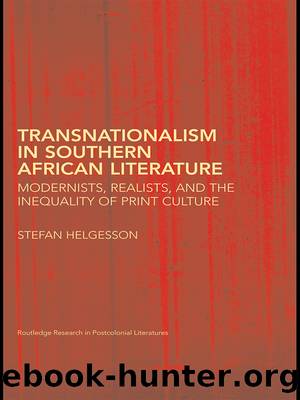Transnationalism in Southern African Literature by Stefan Helgesson

Author:Stefan Helgesson [Helgesson, Stefan]
Language: eng
Format: epub
Tags: History, Africa, South, General, Literary Criticism, African, European, Spanish & Portuguese, Books & Reading
ISBN: 9781134042531
Google: 3Xd8AgAAQBAJ
Publisher: Routledge
Published: 2008-08-18T01:15:26+00:00
4 Sing for Our Metropolis
Self and Media in the Poetry of Rui Knopfli and Wopko Jensma
In the system of genres upheld by europhone discourse networks, the lyric genre is particularly ambiguous. On the one hand, it has been viewed as the most subjective form of literature. In lyric poetry, the assumption has been, the self is expressed; personal feelings are subjected to form (Cullhed 2001: 246â320). On the other hand, the lyric has also been seen as the genre that evacuates the self. Through lyric, the poet does not speak but is spoken through. Depending on the period, the real speaker has been called by various names such as âthe muse,â âtradition,â âthe unconscious,â or âthe other.â As Susan Stewart (1995: 24) puts it in her article âLyric Possessionâ: âWhen actors become the recipients of actions, when speakers speak from the position of listeners, when thought is unattributable and intention wayward, the situation of poetry is evoked.â1 In the present chapter, I will consider this rift between self and the effacement of self in the work ofâmainlyâthe southern African poets Wopko Jensma and Rui Knopfli, the former from South Africa and the latter from Mozambique, both active in the 1960s and 1970s. Specifically, I intend to look at the connections between lyrical subjectivity, location, and globally circulating media. I want to ask, in other words, how the two poets engage the situation of lyric poetry by way of their historical situatedness in late colonial southern Africa and as consumers of contemporary media. The last point is crucial. Rather than naturalize printed words, photographs, recorded music, or film, Jensma and Knopfli tend to emphasize the materiality of signs. All of Jensmaâs books combine word and image, moving from the high-art paradigm of woodcuts on fine paper in Sing for Our Execution to a rough-and-ready mixture of lyric poetry (in a somewhat more conventional sense), concretist assemblages, photocollage, and woodcuts in his significantly entitled last work I Must Show You My Clippings. In Knopfliâs case, his homage to Mozambique Island, A Ilha de Próspero, combines poetry and photographs taken by the author himself. The poetry he produced while still in Mozambique generally evinces an accelerating degree of media awareness. Mangas Verdes com Sal, his magnum opus, repeatedly undercuts the generic assumption of the lyric as an expression of self. Indeed, Knopfliâs deployment of media such as print and film often suggests that the poetic subject is constituted rather than expressed discursively. This does not mean that Jensma and Knopfli simply disavow subject-centred lyric. Rather, it is how their lyric addresses the contradictions of this aspiration in the mediatized circumstances of southern Africa that is of interest. Even as their work remains prey to the racialized and Eurocentric inflections of the media with which it engagesâand through which it existsâit subverts the surreal âTechnicolor filmâ (Knopfli 2001b) of the late colonial period in southern Africa.
Media-specific analysis of the kind I am suggesting may, as I have been arguing, yield particular rewards when elaborated
Download
This site does not store any files on its server. We only index and link to content provided by other sites. Please contact the content providers to delete copyright contents if any and email us, we'll remove relevant links or contents immediately.
The Power of Myth by Joseph Campbell & Bill Moyers(1057)
Half Moon Bay by Jonathan Kellerman & Jesse Kellerman(979)
Inseparable by Emma Donoghue(976)
A Social History of the Media by Peter Burke & Peter Burke(976)
The Nets of Modernism: Henry James, Virginia Woolf, James Joyce, and Sigmund Freud by Maud Ellmann(900)
The Spike by Mark Humphries;(809)
The Complete Correspondence 1928-1940 by Theodor W. Adorno & Walter Benjamin(783)
A Theory of Narrative Drawing by Simon Grennan(775)
Culture by Terry Eagleton(771)
Ideology by Eagleton Terry;(733)
World Philology by(712)
Farnsworth's Classical English Rhetoric by Ward Farnsworth(711)
Bodies from the Library 3 by Tony Medawar(708)
Game of Thrones and Philosophy by William Irwin(707)
High Albania by M. Edith Durham(699)
Adam Smith by Jonathan Conlin(687)
A Reader’s Companion to J. D. Salinger’s The Catcher in the Rye by Peter Beidler(686)
Comic Genius: Portraits of Funny People by(649)
Monkey King by Wu Cheng'en(647)
